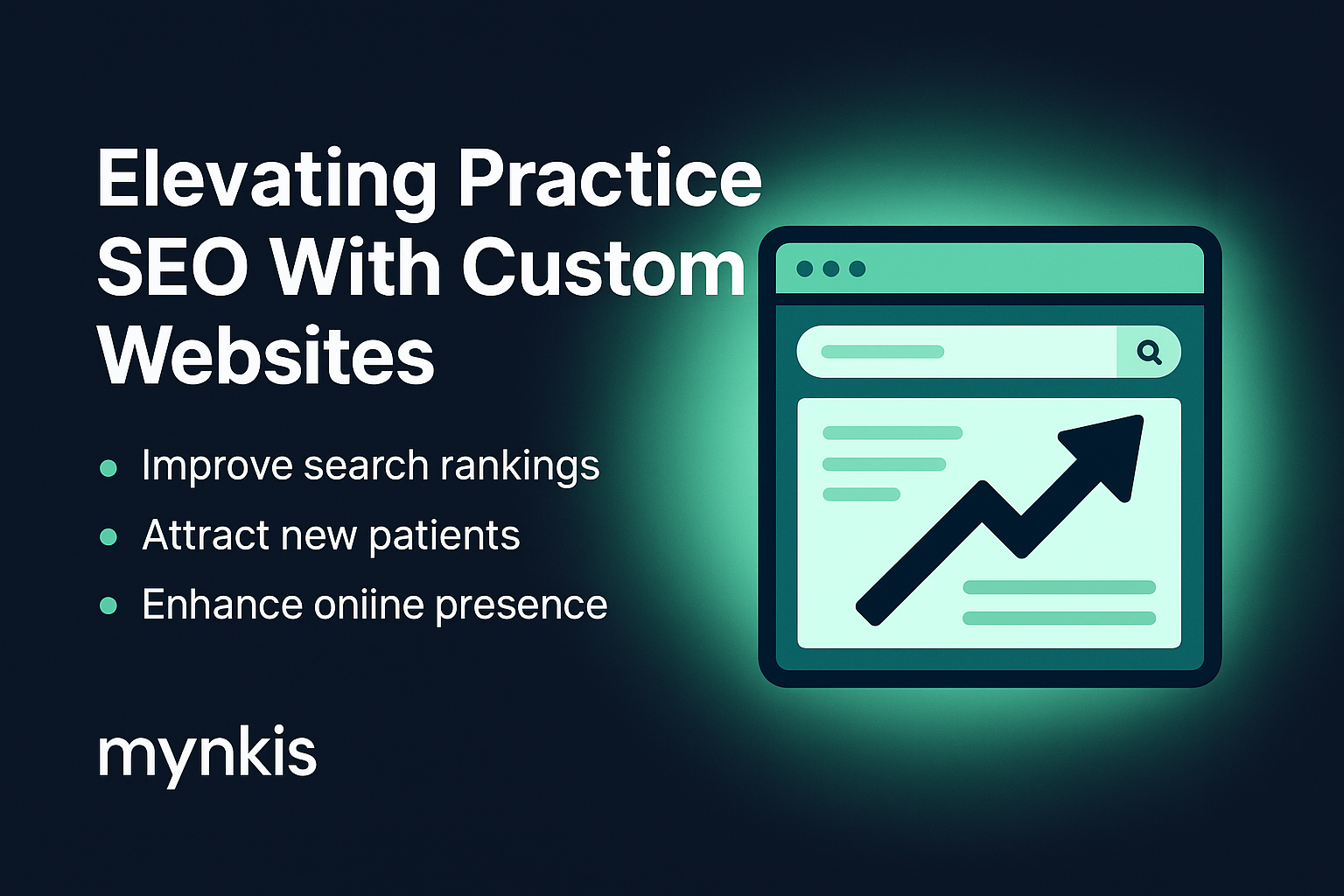Schedule a Demo
In today's competitive digital market, having a website isn't enough for practices wanting to stand out and attract more clients. SEO, or Search Engine Optimization, is crucial for ensuring your custom website doesn't just exist but thrives. By integrating SEO from the initial stages of development, practices can significantly enhance their online visibility and reach their target audience more effectively.
When developing a custom website, it's essential to align the project's objectives with robust SEO strategies. Begin by defining what you want to achieve with your website—are you looking to increase client inquiries, promote specific services, or both? For instance, in my work with various operations managers, I've seen that practices focusing on attracting clients with specific needs can benefit from targeting niche keywords that reflect their expertise.
Keyword research is where effective SEO begins. It's not just about finding the words your potential clients might search for, but also understanding the intent behind those searches. I've often found that legal practices see better results focusing on terms like 'best personal injury lawyer' rather than just 'lawyer' due to higher intent and relevance. By identifying and integrating the right keywords into your website's content and structure from the onset, you're setting the stage for better search rankings and more targeted traffic.
A well-structured website enhances both SEO and user experience. Ensure your site's architecture is intuitive, with clear navigation that aligns with SEO best practices. For example, incorporating breadcrumbs not only improves user navigation but also helps search engines understand your site's hierarchy, which can boost your SEO. While developing the site, consider how users will interact with it—faster load times, mobile responsiveness, and easy access to key information are all SEO-friendly user experience elements.
Content remains paramount for both SEO and engaging your practice's audience. However, the way you structure your content can significantly impact its SEO value. Use headings (
On-page SEO is about optimizing individual pages on your site to rank higher and earn more relevant traffic. This includes optimizing title tags, meta descriptions, and URLs to include relevant keywords. Beyond these basics, implementing schema markup can make your website's entries more informative and attractive in search results. Think of schema as a translator that helps search engines understand what your content means—be it a review, a business listing, or an event.
While on-page SEO focuses on content and keywords, technical SEO deals with the site's backend to ensure optimal search engine performance. This includes site speed optimization, mobile-friendliness, secure (HTTPS) connections, and the proper implementation of canonical tags to avoid duplicate content issues. Practices must understand that poor technical SEO can undermine even the most well-optimized content.
For practices targeting local clients, optimizing for local SEO is critical. Ensure your practice's name, address, and phone number (NAP) are consistent across the web, especially on local directories and Google My Business. Additionally, securing positive reviews and engaging with your community online can elevate your local search visibility. By targeting local keywords combined with your services, you tap into the audience most likely to walk through your doors.
Backlinks, or inbound links from other reputable sites to yours, serve as endorsements that can boost your site's credibility and authority. For legal or medical practices, acquiring high-quality backlinks from directories, educational resources, or industry-related content can be challenging but rewarding. A strategy that has worked well is collaborating with influencers or thought leaders in your field to not only gain valuable backlinks but also enhance your site's standing with the audiences you most want to reach.
SEO is not a set-it-and-forget-it task; it requires ongoing attention and optimization. Use tools like Google Analytics and Google Search Console to monitor your website's performance regularly. Track where your traffic is coming from, how visitors interact with your site, and where improvements can be made. Adjust your SEO strategies based on these insights, ensuring your site remains relevant and continues to climb search engine rankings.
When integrating SEO into your custom website, it's crucial to maintain a balance with your practice's branding and aesthetics. Your website should not only rank well but also reflect the professionalism and quality of your services. I've worked with design agencies that prioritize aesthetics to the detriment of SEO, leading to stunning but poorly ranked sites. Conversely, an SEO-optimized site that looks outdated or unprofessional can deter potential clients. Striking this balance is key to attracting and retaining the right audience.
While internal efforts to incorporate SEO into custom website development are essential, engaging with SEO experts can elevate your strategies to the next level. Professionals bring a deep understanding of current trends, algorithm updates, and nuanced SEO practices that can make a significant difference in how your site performs. They can offer valuable insights based on industry standards and competitive analysis, ensuring your practice's website stands out in the crowded digital space.
SEO and content marketing should work hand in hand to drive success for your practice's website. Content marketing focuses on creating valuable, relevant content to attract and engage your audience, which in turn supports your SEO efforts by generating organic traffic and improving site engagement metrics. Regular blog posts, infographics, or case studies can target keywords relevant to your practice, helping improve your search rankings while simultaneously establishing your authority in your field.
Finally, measuring the success of your SEO efforts and adapting your strategies accordingly is crucial for long-term growth. Look beyond traffic metrics to measure conversion rates, keyword rankings, and bounce rates to get a holistic view of your SEO performance. Based on these metrics, refine your approach—perhaps by tweaking your target keywords, enhancing on-page elements, or updating your backlink strategy. The key is to stay adaptable, leveraging SEO as a dynamic tool for your practice's growth.
